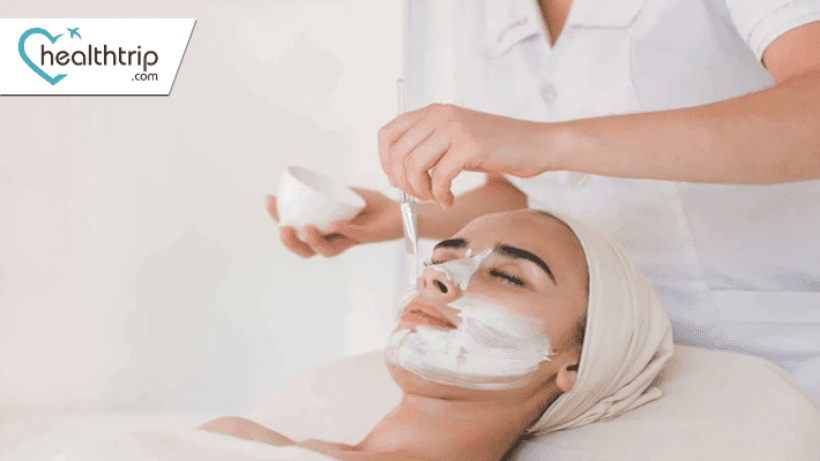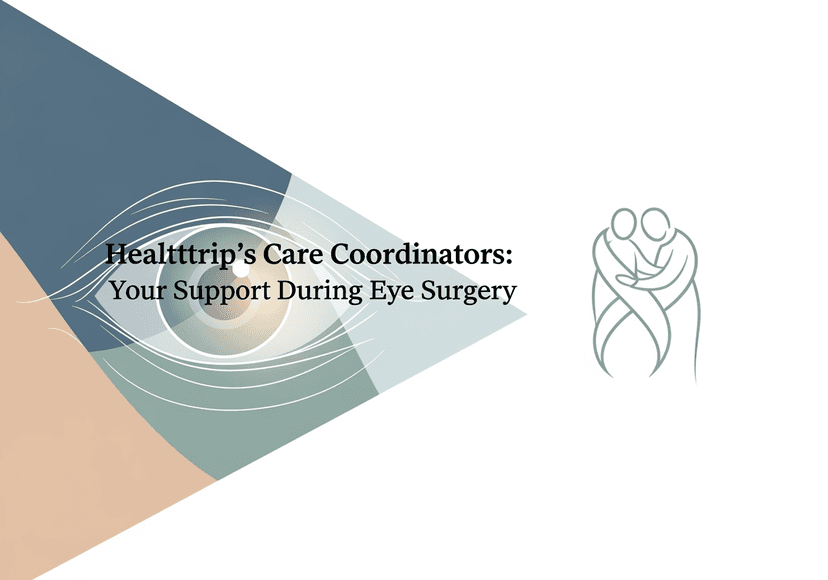
Expert Answers to Your Common Questions on chemical peels
17 Nov, 2023
 Healthtrip Team
Healthtrip TeamCombining chemical peels with other cosmetic procedures like laser treatments or dermal fillers can offer a powerful approach to achieving comprehensive skin rejuvenation. In this guide, we've answered frequently asked questions regarding chemical peels, including their benefits, recovery times, suitability for various skin types, and how to prepare for the procedure. We've also discussed the importance of post-peel care, potential risks and complications, and the integration of chemical peels with other skincare routines. Whether you're considering a chemical peel for a specific skin concern or seeking insights into enhancing your skincare regimen, this comprehensive FAQ provides valuable information to help you make informed decisions about your skincare journey.
A chemical peel is a dermatological procedure that involves the application of a chemical solution to the skin's surface. This solution causes the top layer of the skin to peel off, revealing smoother, fresher skin underneath. Chemical peels are commonly used to address various skin issues, including acne scars, fine lines, and uneven skin tone.
Most popular procedures in India
FAQ #1: How long does it take to recover from a chemical peel?
Wellness Treatments
Give yourself the time to relax
Lowest Prices Guaranteed!

Lowest Prices Guaranteed!
The recovery time after a chemical peel can vary depending on the depth of the peel and individual factors. Generally, for a light peel, you can expect a few days of redness and peeling, while a medium-depth peel may require a week or more for the skin to fully heal. Deep peels can take several weeks to recover from. It's essential to follow post-peel care instructions provided by your dermatologist to expedite the healing process and minimize complications.
FAQ #2: What's the downtime after a medium-depth chemical peel?
The downtime after a medium-depth chemical peel can range from 7 to 14 days. During this period, you can expect redness, peeling, and some discomfort. It's crucial to avoid sun exposure and follow a gentle skincare routine to ensure proper healing.
FAQ #3: Does recovery time vary with different chemical peel solutions?
Yes, recovery time can vary depending on the type of chemical peel solution used. Lighter peels, such as glycolic or salicylic acid peels, typically have a shorter recovery time compared to medium or deep peels, like TCA or phenol peels. The depth and strength of the solution will influence how long it takes for your skin to heal.
FAQ #4: Can you speed up recovery after a chemical peel?
While you can't accelerate the skin's natural healing process, you can follow your dermatologist's recommendations to optimize recovery. This may include using gentle skincare products, avoiding sun exposure, and staying hydrated. Do not try to expedite healing by picking at or scrubbing the peeling skin, as this can lead to complications.
FAQ #5: Any tips to minimize downtime after a chemical peel?
To minimize downtime after a chemical peel, consider the following tips:
- Stay out of the sun and use broad-spectrum sunscreen.
- Follow your dermatologist's post-peel skincare regimen.
- Keep the skin well-hydrated.
- Avoid strenuous exercise and activities that cause excessive sweating.
- Use gentle cleansers and avoid harsh skincare products.
FAQ #6: Do chemical peels hurt during the procedure?
The level of discomfort during a chemical peel can vary from person to person and depends on the type and strength of the peel being used. Light peels typically cause minimal discomfort, while medium and deep peels may cause a stinging or burning sensation. Your dermatologist may use numbing creams or local anesthesia to minimize discomfort during the procedure.
FAQ #7: How long does a typical chemical peel session last?
A typical chemical peel session usually takes about 30 minutes to an hour, depending on the type and size of the treatment area. The actual application of the peel solution is relatively quick, but additional time may be needed for preparation and post-peel care instructions.
FAQ #8: When can you expect to see results after a chemical peel?
Results from a chemical peel become noticeable as the skin heals, which can take several days to weeks, depending on the depth of the peel. Light peels may yield subtle improvements sooner, while deeper peels may require more time for noticeable changes.
FAQ #9: What factors can influence the effectiveness and duration of results?
Several factors can influence the effectiveness and duration of results, including the type of peel, the depth of the peel, skin type, and how well you maintain your post-peel skincare regimen. Sun protection and proper skincare can help prolong the benefits of a chemical peel.
FAQ #10: Are there any side effects associated with chemical peels?
Yes, chemical peels can have side effects, including redness, peeling, temporary hyperpigmentation or hypopigmentation, and in rare cases, scarring or infection. The risk of side effects depends on the type and depth of the peel, as well as individual factors. It's crucial to discuss potential side effects with your dermatologist before undergoing a peel.
FAQ #11: Is it safe to get a chemical peel for sensitive skin?
Chemical peels can be safe for sensitive skin when performed by a skilled dermatologist who tailors the peel's depth and solution to the individual's skin type and sensitivity. Lighter peels, such as glycolic acid peels, are often suitable for sensitive skin, but it's essential to communicate your skin's sensitivity to your dermatologist to minimize the risk of adverse reactions.
FAQ #12: Can individuals with darker skin tones undergo chemical peels?
Yes, individuals with darker skin tones can undergo chemical peels, but they should seek out a dermatologist experienced in treating diverse skin types. Lighter peels with ingredients like glycolic or lactic acid are generally safer for darker skin tones. However, there is a higher risk of post-inflammatory hyperpigmentation (PIH), so pre- and post-peel care, as well as sun protection, are crucial.
FAQ #13: Are there specific chemical peels designed for different skin types?
Yes, there are various chemical peel formulations designed to address specific skin concerns and types. Dermatologists often customize peels based on the patient's skin type, concerns (e.g., acne, hyperpigmentation, aging), and desired outcomes. The choice of peel solution and its strength will vary accordingly.
FAQ #14: How do dermatologists determine the right chemical peel for a particular skin type?
Dermatologists assess a patient's skin type, concerns, medical history, and goals before recommending a specific chemical peel. They may also perform a patch test to evaluate how the skin responds to the peel solution. The goal is to choose a peel that provides benefits while minimizing the risk of adverse effects.
FAQ #15: What precautions should be taken for different skin types before and after a chemical peel?
Precautions before and after a chemical peel can vary, but common recommendations include:
- Avoiding sun exposure before treatment.
- Discontinuing certain skincare products or medications as advised by the dermatologist.
- Adhering to the post-peel skincare regimen.
- Wearing sun protection daily, even after the skin has healed.
- Monitoring the skin for any adverse reactions and promptly notifying the dermatologist.
FAQ #16: Can individuals with acne-prone skin get chemical peels?
Yes, chemical peels can be beneficial for individuals with acne-prone skin. Peels can help reduce acne lesions, improve skin texture, and minimize the appearance of acne scars. Dermatologists may recommend peels with salicylic acid or other acne-fighting ingredients.
FAQ #17: Are chemical peels recommended for individuals with rosacea?
Chemical peels are generally not recommended for individuals with rosacea, as they can exacerbate redness and inflammation. However, certain types of very mild peels may be considered in consultation with a dermatologist. It's essential to manage rosacea with suitable skincare and medications.
FAQ #18: What precautions should people with eczema or psoriasis take?
Individuals with eczema or psoriasis should avoid chemical peels, as these conditions compromise the skin's barrier and make it more susceptible to irritation and complications. Instead, they should focus on managing their skin conditions with specialized treatments and moisturizers.
FAQ #19: Are there any contraindications for specific skin conditions when it comes to chemical peels?
Yes, there are contraindications for certain skin conditions, including active skin infections, open wounds, sunburn, and autoimmune skin disorders. Individuals with these conditions should not undergo chemical peels until their skin is in a healthier state.
FAQ #20: How can individuals with skin conditions benefit from chemical peels?
Individuals with certain skin conditions, like acne, may benefit from chemical peels under the guidance of a dermatologist. However, the treatment should be carefully tailored to their condition, and potential risks should be considered.
FAQ #21: Can you wear makeup immediately after a chemical peel?
It is not recommended to wear makeup immediately after a chemical peel, especially during the initial healing phase. The skin needs time to recover, and makeup can introduce contaminants and impede the healing process. Follow your dermatologist's post-peel skincare regimen before considering makeup application.
FAQ #22: When is it safe to apply makeup after a chemical peel?
It is generally safe to apply makeup once the skin has fully healed, which can take several days to weeks, depending on the peel's depth. Follow your dermatologist's guidance on when it's appropriate to resume makeup application.
FAQ #23: Are there any specific makeup products recommended for post-peel use?
Mineral-based makeup is often recommended for post-peel use because it tends to be gentler on healing skin and less likely to cause irritation. Look for makeup products that are free of fragrances, dyes, and other potential irritants.
FAQ #24: How does makeup application affect the healing process after a chemical peel?
Makeup should be applied with care to avoid disrupting the healing skin. Gentle application techniques and clean brushes or sponges are essential. Also, ensure that makeup is thoroughly removed at the end of the day to allow the skin to breathe and recover.
FAQ #25: Are there any makeup-related myths associated with chemical peels?
One common myth is that makeup can be used to conceal or mask the peeling skin during the recovery phase. However, it's best to allow the skin to naturally shed and heal rather than trying to hide it with makeup, as this can potentially irritate the skin further.
FAQ #26: How often should one undergo chemical peels for skin rejuvenation?
The frequency of chemical peels for skin rejuvenation depends on the individual's skin type, concerns, and the type of peel used. Lighter peels may be performed every 2-4 weeks, while deeper peels require more extended intervals, often several months apart. Your dermatologist will create a personalized treatment plan based on your specific needs.
FAQ #27: Are there guidelines for maintenance peels after achieving desired results?
After achieving the desired results, maintenance peels may be recommended periodically to sustain the benefits. These maintenance peels are typically less frequent than initial treatments and serve to prolong the results and address any new skin concerns that may arise.
FAQ #28: Can you overdo chemical peels, and what are the consequences?
Yes, overdoing chemical peels can lead to several issues, including excessive skin sensitivity, thinning of the skin, scarring, and increased risk of hyperpigmentation or hypopigmentation. It's essential to follow your dermatologist's recommendations and avoid excessive or frequent peels.
FAQ #29: Is the frequency of chemical peels the same for different skin concerns?
The frequency of chemical peels can vary depending on the specific skin concern being addressed. Some concerns may require more frequent treatments than others. Your dermatologist will determine the appropriate treatment plan based on your goals and skin condition.
FAQ #30: How does skin type and condition influence the recommended frequency of chemical peels?
Skin type and condition play a significant role in determining the recommended frequency of chemical peels. Those with sensitive or darker skin may require gentler and less frequent peels to minimize the risk of complications. Skin conditions, such as acne or hyperpigmentation, may require a series of peels spaced at specific intervals.
FAQ #31: Can chemical peels completely eliminate all types of acne scars?
While chemical peels can improve the appearance of some types of acne scars, they may not completely eliminate all scars, particularly deep or icepick scars. Combination treatments, such as laser therapy or microneedling, may be necessary for more significant scar reduction.
FAQ #32: What types of acne scars are most responsive to chemical peels?
Chemical peels are most effective for addressing shallow acne scars, such as rolling or boxcar scars, and for improving overall skin texture and tone. They may have limited effectiveness for deep or pitted scars.
FAQ #33: Are there alternative treatments for stubborn acne scars?
Yes, there are alternative treatments for stubborn acne scars, including laser therapy, microneedling, dermal fillers, and surgical procedures like subcision or excision. The choice of treatment depends on the type and severity of the scars.
FAQ #34: How long does it typically take to see improvements in acne scars with chemical peels?
Improvements in acne scars with chemical peels can vary depending on the depth of the scars and the type of peel used. Some individuals may notice improvements after a few sessions, while others may require several months of treatment to see significant changes.
FAQ #35: Are multiple sessions required for significant scar reduction with chemical peels?
Yes, multiple sessions of chemical peels are often required for significant scar reduction. A series of peels spaced at appropriate intervals can provide gradual and cumulative improvements in the appearance of acne scars.
FAQ #36: Can you combine chemical peels with laser treatments or dermal fillers?
Yes, combining chemical peels with other cosmetic procedures like laser treatments or dermal fillers can be an effective approach for addressing multiple skin concerns simultaneously. This combination can provide comprehensive rejuvenation and enhanced results.
FAQ #37: What are the advantages of combining different cosmetic procedures with chemical peels?
Combining procedures can offer several advantages, including addressing a broader range of skin concerns, enhancing the overall effectiveness of the treatments, achieving more comprehensive and longer-lasting results, and reducing the need for multiple individual treatments.
FAQ #38: How do dermatologists customize treatment plans when combining procedures?
Dermatologists customize treatment plans by assessing the patient's unique needs and goals. They carefully select the combination of procedures, determine the order of treatment, and establish appropriate intervals between sessions to optimize safety and results.
FAQ #39: What precautions should be taken when combining treatments for enhanced results?
Precautions when combining treatments include ensuring that the chosen procedures are compatible and safe to combine, following post-treatment care instructions meticulously for each procedure, monitoring the skin's response, and addressing any adverse effects promptly. Being aware of potential contraindications or interactions between treatments is also essential.
FAQ #40: Are there any contraindications for combining chemical peels with other cosmetic procedures?
Some contraindications may exist for combining procedures, depending on the patient's medical history and skin condition. Dermatologists carefully assess each case to identify any potential contraindications and ensure patient safety.
FAQ #41: How long do the results of a chemical peel typically last?
The duration of chemical peel results varies depending on factors such as the type of peel, skincare maintenance, and sun protection. Light peels may require more frequent maintenance, while deeper peels can provide longer-lasting results, often for several months to a year or more.
FAQ #42: Are there ways to prolong the effects of a chemical peel?
To prolong the effects of a chemical peel, it's essential to maintain a consistent skincare regimen recommended by your dermatologist, use broad-spectrum sunscreen daily to protect the skin from UV damage, avoid excessive sun exposure and tanning, and stay hydrated while leading a healthy lifestyle to support skin health.
FAQ #43: Do repeated chemical peels lead to longer-lasting results?
Repeated chemical peels can contribute to longer-lasting results by addressing cumulative skin damage over time. Regular maintenance peels can help maintain and enhance the benefits achieved with initial treatments.
FAQ #44: Can lifestyle choices affect the permanence of chemical peel outcomes?
Yes, lifestyle choices can significantly impact the permanence of chemical peel outcomes. Factors such as smoking, sun exposure, and poor skincare habits can diminish the longevity of results. Leading a healthy lifestyle and practicing good skincare can help maintain results.
FAQ #45: What factors might cause the results of a chemical peel to fade more quickly?
Factors that can cause the results of a chemical peel to fade more quickly include excessive sun exposure without proper protection, smoking and exposure to environmental toxins, poor skincare practices, or neglecting recommended post-peel care, and not following up with maintenance peels as advised by your dermatologist.
FAQ #46: Where can I find reputable clinics or dermatologists for chemical peel treatments in my area?
To find reputable clinics or dermatologists for chemical peel treatments, consider seeking recommendations from friends, family, or your primary care physician, checking online reviews and ratings,and scheduling consultations with experienced dermatologists to discuss your needs.
Explore a world of beauty and wellness with our dermatology and cosmetology treatments at HealthTrip. Your journey to radiant skin begins here!
FAQ #47: What is the cost of a chemical peel treatment, and does it vary depending on the type of peel?
The cost of a chemical peel treatment varies based on factors such as the type of peel, the provider's expertise, and the geographic location. Light peels may cost a few hundred dollars per session, while medium and deep peels can range from several hundred to over a thousand dollars.
FAQ #48: Are there any before-and-after photos or testimonials from individuals who have undergone chemical peel treatments?
Many reputable clinics and dermatologists provide before-and-after photos and testimonials from patients who have undergone chemical peel treatments. These can offer insights into the potential results and experiences of others.
FAQ #49: What are the potential risks and complications associated with chemical peels, and how rare are they?
Potential risks and complications of chemical peels can include redness, peeling, hyperpigmentation, hypopigmentation, scarring, infection, and allergic reactions. The occurrence of these complications varies depending on factors like the type and depth of the peel, the patient's skin type, and the skill of the provider. Severe complications are relatively rare when performed by experienced professionals.
FAQ #50: How do I prepare for a chemical peel appointment, and is there anything I should avoid before the treatment?
Before a chemical peel, you should follow any pre-peel skincare regimen recommended by your dermatologist, avoid sun exposure and tanning for several weeks leading up to the peel, discontinue the use of specific skincare products or medications as advised, and arrive at the appointment with clean, makeup-free skin.
FAQ #51: What is the consultation process like when considering a chemical peel, and what questions should I ask the provider?
The consultation process typically involves discussing your goals, assessing your skin, and determining the most suitable type of peel. Ask questions about the provider's experience and credentials, the type of peel recommended and why, expected results and potential risks, pre- and post-peel care instructions, cost, and the recommended treatment plan.
Learn more about our consultation process and schedule your appointment on our Healthtrip.
FAQ #52: Are there any special considerations or precautions for pregnant or breastfeeding individuals considering a chemical peel?
Pregnant and breastfeeding individuals should generally avoid chemical peels due to the potential risk to the developing fetus or infant. It's essential to consult with a healthcare professional and discuss safe skincare options during this period.
FAQ #53: What is the recommended age range for getting a chemical peel?
There is no strict age limit for getting a chemical peel, as the decision is based on individual skin concerns and goals. Chemical peels can benefit individuals in their 20s and beyond who have specific skin issues like acne, hyperpigmentation, or signs of aging.
FAQ #54: Is there any specific skincare or products I should use before and after a chemical peel to enhance the results?
Your dermatologist will recommend specific pre- and post-peel skincare products tailored to your needs. Generally, gentle cleansers, moisturizers, sunscreen, and prescribed ointments or creams are commonly used to enhance results and promote healing.
FAQ #55: Can I combine chemical peels with other skincare routines, such as microdermabrasion or facials?
Combining chemical peels with other skincare routines like microdermabrasion or facials may be possible, but it depends on the individual's skin and the specific treatments involved. Consult with your dermatologist to determine the best approach and sequencing for your skincare needs.
This FAQ Blog has provided a wealth of information on chemical peels, including their benefits, recovery times, suitability for different skin types, and precautions to take before and after the procedure. We've also explored the possibilities of combining chemical peels with other cosmetic treatments for enhanced results.
Most popular wellness packages
Related Blogs

How Healthtrip Ensures Quality & Safety in Eye Surgery Procedures
Detailed guide on eye surgery, featuring doctors, hospitals, risks, recovery,

End-to-End Logistics for Eye Surgery with Healthtrip's Support
Detailed guide on eye surgery, featuring doctors, hospitals, risks, recovery,

Healthtrip's Care Coordinators: Your Support During Eye Surgery
Detailed guide on eye surgery, featuring doctors, hospitals, risks, recovery,

Top 5 Indian Hospitals for Eye Surgery
Detailed guide on eye surgery, featuring doctors, hospitals, risks, recovery,

Post-Eye Surgery Diet and Lifestyle Tips
Detailed guide on eye surgery, featuring doctors, hospitals, risks, recovery,

Common Risks in Eye Surgery and How Healthtrip Manages Them
Detailed guide on eye surgery, featuring doctors, hospitals, risks, recovery,










